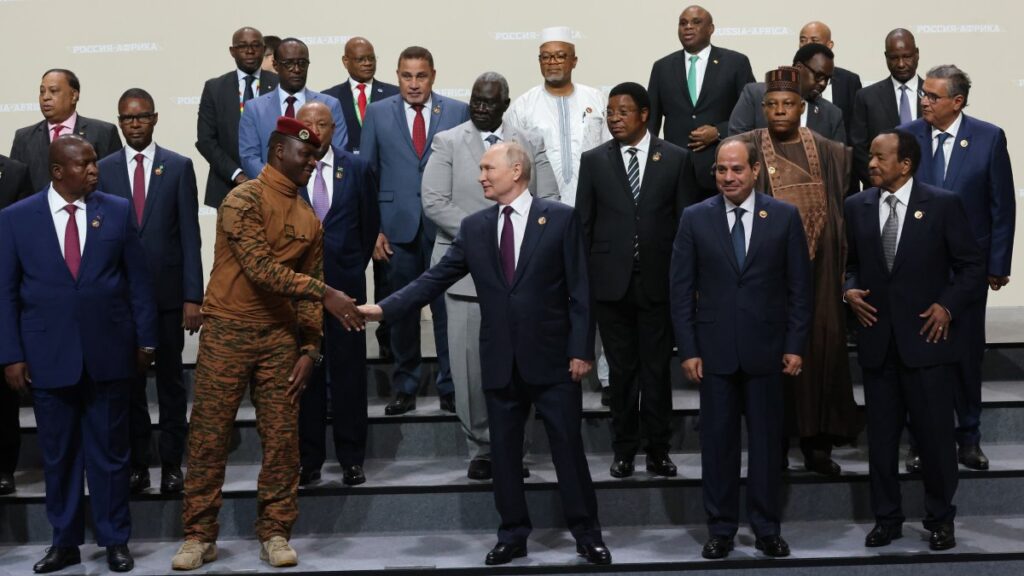- In recent years, Moscow has focused on building new Russia-Africa ties.
- Russia is interested in searching for new economic markets and geopolitical influence in Africa.
- Russia’s trade with African economies stood at only $18 billion in 2022.
In recent years, Moscow has focused on building new Russia-Africa ties. Russia is invigorating alliances developed during the Cold War when the former Soviet Union supported socialist movements across Africa.
Following the Soviet Union’s collapse in 1991, Moscow largely withdrew from the continent. However, since at least 2007, Russia has refocused its involvement and influence in Africa.
Over the years, Russia has contracted with over 30 African countries to provide military equipment and armaments. Businesses, including state-backed commercial interests, have invested significantly in technology security sectors and industries that extract natural resources, including oil, gas, gold, and other minerals.
“Russia is clearly interested, in search of new economic markets and geopolitical influence in Africa,” observes Tatiana Smirnova, a postdoctoral researcher at the University of Quebec’s Centre FrancoPaix and an associate with the University of Florida’s Sahel Research Group. “It is important for Russia.”
According to Russia’s President Vladimir Putin, Russia’s overtures in recent years offer cooperation without the “political or other conditions” imposed by Western countries.
The grain and fertiliser factor in Russia-Africa ties
Russian free grain shipments will land in Africa in the next few days. This gives fresh impetus to Moscow’s bid to solidify its African influence. President Putin had promised to donate grain to six African countries with close association with Moscow at the Russia-Africa Summit in July in St. Petersburg.
The move followed criticism that Russia’s war in Ukraine and the subsequent withdrawal from an agreement that facilitated the export of Ukrainian grain through the Black Sea had resulted in rising global fertilizer and food prices.
The shipments will sum up to 200,000 tonnes by the end of 2023. This is according to Russia’s Ministry of Agriculture, as cited by the Interfax news agency on 17 November. Burkina Faso and Somalia will be the first recipients.
Moreover, as Russia’s President said in July, the Central African Republic, Eritrea, Mali, and Zimbabwe will receive 25,000 and 50,000 tonnes of grain each. That donation only represents a tiny fraction of what these countries consume.
Strengthening ties
Russia’s push to strengthen ties with African countries by heightening trade and deploying Wagner mercenaries to prop up political stability in warring countries follows moves by the US and its allies to isolate Moscow in response to the Ukrainian invasion.
However, Russia remains a minor player in Africa. Russia’s trade with African economies stood at only $18 billion in 2022. This is a small fraction compared to, for instance, China’s $282 billion worth of trade with African economies.
Findings from a Cape Town conference on Sunday organised by a foundation by South Africa’s former president Thabo Mbeki sought to dispel the idea that Moscow was entirely to blame for rising global food prices.
South Africa has adopted a non-aligned standpoint towards the war in Ukraine that has drawn significant criticism from the US and some of its trading partners.
Read also: South Sudan in delicate dance with Russia as historic elections loom
Falling grain, vegetable oil, and fertiliser exports
Direct or indirect sanctions imposed on Russia and its counterpart Belarus cut global ammonia and fertiliser supplies by 40.8 tonnes through April this year. This has been revealed in a study backed by a fund founded by Russian fertiliser billionaire Andrey Melnichenko.
Russia and Ukraine are two of the leaders in grain and vegetable oil exporters globally. The war has affected global supplies of the two commodities amid Russia’s bombing of Ukrainian ports and stores.
Russia’s fertiliser has not been subject to international sanctions. Nevertheless, penalties imposed on owners of companies that produce fertiliser in Russia and restrictions by the logistics and banking industries resulted in exports falling in 2022. They have since recovered, causing a fall in prices.
The study’s analysis of the effect of the Black Sea grain indicated that it helped feed 95 million people but fell short of guaranteeing that fertiliser from Russia would float freely to the global markets. Had that been the case, it could have boosted food production to feed about 199 million, according to the study.
The billionaire, Melnichenko, with dual citizenship from Russia and the United Arab Emirates, was sanctioned by the US and the European Union after Russia invaded Ukraine. He toured South Africa towards the end of 2022 to woo politicians to support pleas for the EU to resolve the fertiliser supply issues.
‘The 21st Scramble for Africa’
The global superpowers have continued their “Scramble for Africa” trend that started in the 1880s upon discovering the continent’s resource wealth. The competition for control has become a monument to the power dynamics and the deft political maneuvering of the global superpowers for intense rivalry and a motivated desire for dominance.
A new arena of imperial ambition has existed since the 19th century, taking place across Africa’s enormous expanse rather than on the battlefield. The desire for Africa’s natural resources and geopolitical advantage sparked a frenzy of control.
Control over Africa’s immense resources, key sea connections, and significant economic potential remain driving forces. Africa’s diversity in people and wealth has attracted global superpowers.
Russia is not the only foreign government trying to broaden its influence in Africa, home to vast resources, including a surging youth population. The European Union, China, India, and Turkey, among others, have shown considerable interest in building ties with Africa.
The US has aggressively pursued its quest to bolster its ties with Africa, with Washington holding the Africa leadership summit in December 2022. The US-Africa Leaders Summit demonstrated a renewed commitment to expand partnerships with African countries, institutions, and people.
As part of this revitalized and expanded cooperation, the United States intends to invest $55 billion in Africa over the next three years.
